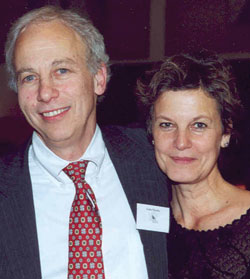 John Marks, founder and president of Search for Common Ground, an international NGO working on conflict transformation and resolution, has spent the past 25 years seeking to help countries in conflict across the world, cutting his teeth initially on US-USSR relations at the height of the cold war. His wife, Susan Collin Marks, who works with him, was involved in South Africa\'s post-apartheid transition to democracy and wrote a book on the subject. The couple talked to Nepali Times about Nepal\'s transition from civil war to peace.
John Marks, founder and president of Search for Common Ground, an international NGO working on conflict transformation and resolution, has spent the past 25 years seeking to help countries in conflict across the world, cutting his teeth initially on US-USSR relations at the height of the cold war. His wife, Susan Collin Marks, who works with him, was involved in South Africa\'s post-apartheid transition to democracy and wrote a book on the subject. The couple talked to Nepali Times about Nepal\'s transition from civil war to peace.
Nepali Times: These days there are lots of peace-building organisations, both local and international. Are you doing anything different from other international missions in Nepal? What are you expecting from your mission?
John Marks: We would like to support the transition and we would like Nepal to have an outcome that is positive.
Susan Collin Marks: The transition is a very special time and when it happens it needs a lot of attention. In my own experience during our transition in South Africa, we had ups and we had downs. What you are doing is that you are moving from the way a society was structured and the way people behaved at one time to a new dispensation. In South Africa, we didn\'t know what it was going to be like. We used to talk about a new South Africa. What happens in a transition is that the old age is dying but a new one is born. What we are trying to do here is to particularly empower youth to make a difference in this fluid state between the old and new and to inspire people to know that it is possible to reach a new Nepal in the way we were reaching a new South Africa.
You had long experience of South Africa during its transition period. What advice can you draw from that for Nepal?
SCM: The transition was for four years and it was important we had that time. The transition is needed for a lot of healing. When you come out of the conflict, there is a lot of pain, fear and anger. There needs to be healing so people can begin to see themselves as Nepalis rather than from different sides of the conflict. For us citizens of South Africa, it was important for us to become ourselves as South Africans. We had been divided for so long, and I don\'t want to say that Nepal is the same as South Africa, but there are principles that can be useful. A big job for people working in peace-building is to engender hope, and a large part of our work is around that.
Is the peace process too slow in Nepal?
JM: Every country needs to finds its own pace. People wish it was quicker but we have never seen a peace process which happens that way. It goes up and down. It is like a roller-coaster. In terms of speed, it is frustrating. You wish it was more efficient, you wish people did things better but they never do.
Does Nepal really need international experts to tell us what to do?
JM: Let\'s just say we can\'t tell anyone what to do. Expertise in one country is not usually the same in another country. It doesn\'t usually transfer. Maybe 25 or 50 percent of the knowledge is applicable. There are no answers to all questions. There could be some answers from South Africa applicable here. But the people who need to do what is considered crucial are Nepalis and it is not going to be us foreigners. But there could be answers, ideas and resources that are useful.
SCM: In a conflict, there is often a need for a mediating force. For two sides who have been in deep conflict, often there isn\'t an ability in the initial phase to be able to really work with each other constructively. There is an understanding of the power of a mediating force as a mechanism for dealing with conflict. What we are trying to do is shift our mechanism through mediation so that people will be able to stand back from the conflict and deal with it in a more reconciliatory manner.
What lessons have you learnt from working in countries going through transition?
JM: Don\'t parachute. We believe strongly in not trying to bring in our methodology from outside. If we are going to do a soap opera, the writers are going to be Nepalis as they understand what is going on here. We maybe able to bring in resources from outside but we let the local partner do the production.
SCM: What we have learnt is that peace is a process and not an event, and there is need for a sense of longevity of the process as it is something that doesn\'t happen overnight. Conflict is normal and natural. It is always going to be there. It needs to be handled constructively so it becomes part of the dynamics
of society.


